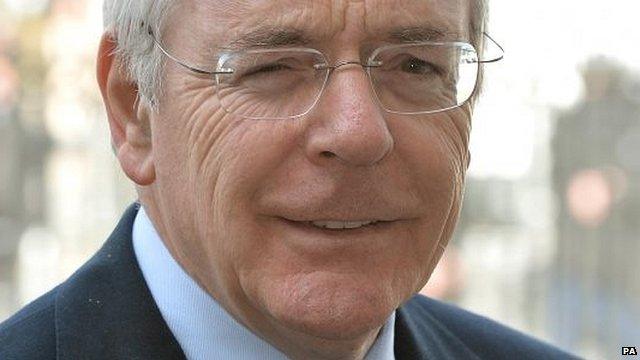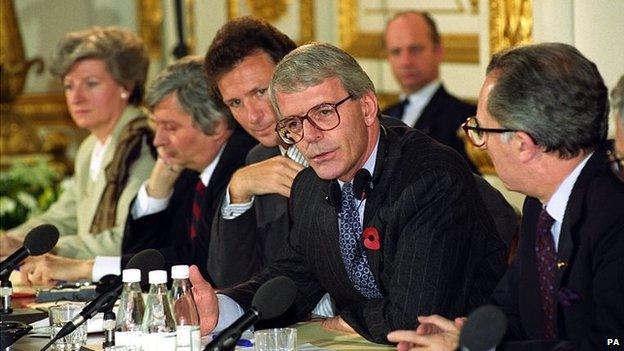Major to Europe - Cut immigration or the UK may leave
- Published

He was the man who said that Britain's place was at the heart of Europe, the man who watched his party riven by divisions over the issue and the man who says he has not "a shred of doubt that the United Kingdom is far better off inside the European Union".
All the more significant then that it is Sir John Major who is tonight telling an audience in Berlin that the UK "may be poised to leave the European Union" as "for the first time, there is a serious possibility that our electorate could vote to leave the EU… I put the chance of exit at just under 50%. But if the negotiations go badly that percentage will rise. Conversely, with genuine reform, it will fall."
Speaking to supporters of Chancellor Merkel's Christian Democrats Sir John says that "Britain's frustration is no game. It is not a political ploy to gain advantages and concessions from our partners."
Major, whose speech was seen and discussed inside Downing Street, argues that a brake on immigration from the EU is needed if the argument for staying in the EU is to be won.
"Our partners must weigh up a choice help us: help us on this issue, or deny us - knowing that the latter course can only fuel the Eurosceptic argument"
His successor David Cameron is expected to make a major speech on immigration in the next few weeks - possibly in around two weeks' time when new immigration statistics are published which are expected to confirm that there is no chance of the Tories fulfilling their election promise to cut net migration to below 100,000.

John Major hosting the then EEC president Jacques Delors in 1992
The former prime minister's words give a strong clue to what David Cameron may argue for: "The UK case on free movement is as compelling as it is misunderstood. And it is misunderstood. It is a matter of numbers.
"Whereas some European populations are falling, the UK has grown by 7% in a decade…. the sheer scale of the influx has put strains on our health, welfare, housing and education services that we struggle to meet - and has held down wages for many of the poorest members of our society.
"I do recognise - reluctantly - that our small island simply cannot absorb the present and projected numbers at the current speed: it is not physically or politically possible without huge public disquiet… I hate having to make this argument. I hate it. As a boy, I was brought up among immigrants in South London. They were my friends and my neighbours… we do not seek to end free movement - far from it: but, while the pressures are uncontainable, we do seek to qualify it."
Sir John also spells out other changes that he expects a future Tory government to demand in any re-negotiation: "We are not prepared to accept 'ever-closer' union: that has only one destination - and for us there is a limit.
"Subsidiarity (the principle that things should only be done by the European Union if they cannot be done by the Nation State) needs to be restated, made legal, and enforced with rigour."
"A timetable to implement reforms previously agreed... when will member states complete the Single Market? When will they end closed shops and protectionism, and open their markets to British services - especially our professional services? When will they fully integrate capital markets? Or the energy market? Or digital? Need I go on?"
When he was in Number 10 Sir John successfully negotiated an opt-out for Britain from joining the euro and the single market. Looking ahead to future negotiations he says that "Wise negotiators will tone down the oratory and turn up the diplomacy" as "we must all realise is that a divorce may be final. Absolute. A reconciliation would be unlikely".